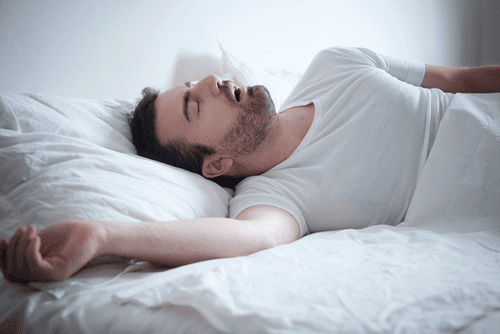Discover the Secret to a Restful Night’s Sleep

The first key element is creating a comfortable sleep environment. This includes having a supportive mattress and pillows, keeping the room cool and dark, and reducing noise and distractions.
Another important factor is establishing a consistent bedtime routine. This involves engaging in relaxing activities before bed, such as reading or taking a warm bath, and avoiding stimulating activities like using electronic devices or drinking caffeine.
Additionally, it’s crucial to prioritize sleep and make it a priority in your daily schedule. This means setting aside enough time for sleep and avoiding late nights or inconsistent sleep patterns.
Lastly, managing stress and anxiety is essential for a restful night’s sleep. Engaging in stress-reducing activities, such as practicing mindfulness or deep breathing exercises, can help calm the mind and promote better sleep.
By understanding and implementing these key elements, you can improve the quality of your sleep and wake up feeling refreshed and rejuvenated.
Key Takeaways
- Creating a comfortable sleep environment with a supportive mattress, cool and dark room, reduced noise, and comfortable temperature is essential for a restful night’s sleep.
- Establishing a consistent bedtime routine that includes engaging in relaxing activities, avoiding stimulating activities, and practicing relaxation techniques can help promote better sleep.
- Prioritizing sleep in our daily schedule by setting aside enough time for sleep, avoiding late nights, and creating a sleep-friendly routine can improve the quality of our sleep.
- Managing stress and anxiety through stress-reducing activities, practicing mindfulness, and calming the mind before bed can contribute to a better sleep experience.
Importance of Quality Sleep
Quality sleep is essential for maintaining optimal mental and physical health. The importance of sleep duration cannot be overstated, as it has a profound impact on overall health.
Adequate sleep is crucial for various aspects of our wellbeing, including focus, alertness, and emotional stability. It allows our brain to reset and recharge, enabling us to be more focused and alert during our waking hours.
On the other hand, lack of sleep can have detrimental effects on mood, wellbeing, and cognitive function.
To ensure quality sleep, it is recommended to consistently get 7 to 9 hours of sleep each night. This ensures that our body and mind have enough time to rest and rejuvenate, promoting optimal health and functioning.
Sleep-Wake Relationship
The relationship between sleep and wakefulness is deeply intertwined and plays a crucial role in our overall well-being and daily functioning. What we do in the waking state directly impacts our ability to fall asleep and stay asleep. Adenosine, a chemical force, builds up in our nervous system and body as we stay awake, creating sleep drive and hunger. Higher levels of adenosine cause sleepiness. Sleep deprivation, which refers to inadequate or poor-quality sleep, can have adverse effects on our mood, well-being, and cognitive function. Consistently getting 7 to 9 hours of quality sleep is crucial in order to avoid the negative consequences of sleep deprivation.
| Sleep-Wake Relationship |
|---|
| – What we do in the waking state affects our ability to fall asleep and stay asleep |
| – Adenosine builds up in our nervous system and body as we stay awake |
| – Higher levels of adenosine cause sleepiness |
Establishing a Consistent Sleep Schedule
Establishing a consistent sleep schedule is essential for maintaining optimal sleep quality and overall well-being. By adhering to a regular bedtime and wake-up time, you can help regulate your body’s internal clock and promote a more restful night’s sleep.
To establish a consistent sleep schedule, it is important to establish a bedtime routine that signals to your body that it is time to wind down and prepare for sleep. This routine may include activities such as reading a book, taking a warm bath, or practicing relaxation techniques.
Additionally, maintaining sleep consistency includes avoiding stimulating activities, such as using electronic devices or consuming caffeine, close to bedtime.
Creating a Sleep-Friendly Environment
To optimize sleep quality and promote a restful night’s sleep, it is crucial to create an environment that is conducive to relaxation and tranquility. One way to achieve this is by creating a calming bedtime routine. Establishing a consistent routine signals to the body that it is time to wind down and prepare for sleep. This can include activities such as reading a book, taking a warm bath, or practicing relaxation techniques like deep breathing or meditation.
Additionally, using aromatherapy can enhance sleep quality. Scents like lavender, chamomile, and jasmine have been shown to promote relaxation and improve sleep. Consider using essential oils or a diffuser in the bedroom to create a soothing atmosphere.
Relaxation Techniques for Better Sleep
Creating a serene and peaceful atmosphere in your bedroom is just the first step towards achieving a restful night’s sleep; incorporating relaxation techniques can further enhance your ability to unwind and prepare for a rejuvenating slumber.
Relaxation techniques for stress relief, such as meditation, can be highly effective in promoting better sleep. Meditation involves focusing your attention and eliminating the stream of thoughts that may be causing stress or anxiety.
By practicing meditation before bed, you can calm your mind, reduce the effects of stress, and promote a sense of relaxation. This can help you transition into a state of deep relaxation, making it easier to fall asleep and experience a more restful sleep throughout the night.
Incorporating regular meditation into your bedtime routine can be a powerful tool for improving sleep quality and overall well-being.
Managing Exposure to Blue Light
Minimizing exposure to blue light, especially in the evening hours, is crucial for optimizing sleep quality and promoting a restful night’s sleep. Blue light, emitted by electronic devices and energy-efficient light bulbs, can disrupt the body’s natural sleep-wake cycle by suppressing the production of melatonin, a hormone that regulates sleep.
To reduce blue light exposure, consider the following:
- Use blue light filters or apps on electronic devices to reduce the amount of blue light emitted.
- Avoid using electronic devices at least one hour before bedtime to allow the body to naturally wind down.
- Invest in blue light-blocking glasses, which can help filter out blue light and promote better sleep.
Avoiding Stimulants Before Bedtime
Avoiding stimulants before bedtime is key to promoting a restful night’s sleep and maintaining optimal sleep quality. Two important stimulants to avoid are caffeine and excessive screen time.
Caffeine, found in coffee, tea, and some sodas, is a powerful stimulant that can interfere with the onset and quality of sleep. It is recommended to avoid consuming caffeine at least six hours before bedtime.
Additionally, reducing screen time before bed is crucial. The blue light emitted by electronic devices like smartphones, tablets, and televisions can suppress the production of melatonin, a hormone that regulates sleep. Limiting screen time at least one hour before bed can help signal the body to wind down and prepare for sleep.
Enhancing Sleep Quality
To optimize the quality of sleep, it is important to implement strategies that promote relaxation and create an ideal sleep environment.
Here are three key ways to enhance sleep quality:
- Improve sleep hygiene: Establish a consistent sleep schedule, practice relaxation techniques before bed, and limit exposure to blue light from electronic devices. These habits can help signal to your body that it’s time to sleep and improve the overall quality of your sleep.
- Create a comfortable sleep environment: Ensure your bedroom is cool, quiet, and dark. Invest in a comfortable mattress and pillows that support your body. These factors can greatly enhance your sleep quality and promote a more restful night’s sleep.
- Consider natural sleep aids: Certain herbs and supplements, such as chamomile, lavender, and melatonin, may help promote relaxation and improve sleep quality. However, it is important to consult with a healthcare professional before using any sleep aids to ensure their safety and effectiveness for your specific needs.
Practicing Good Sleep Hygiene
Maintaining a consistent sleep schedule and creating a conducive sleep environment are essential components of practicing good sleep hygiene. By following these sleep hygiene practices, you can improve your sleep quality and promote a restful night’s sleep. One important aspect of sleep hygiene is establishing a bedtime routine. This routine signals to your body that it is time to wind down and prepare for sleep. It can include activities such as reading a book, taking a warm bath, or practicing relaxation techniques. Additionally, creating a sleep-friendly environment can greatly impact your ability to fall asleep and stay asleep. This can involve keeping your bedroom cool, dark, and quiet, as well as removing electronic devices that emit blue light. By incorporating these practices into your routine, you can optimize your sleep hygiene and enhance your overall sleep quality.
| Sleep Hygiene Practices | Bedtime Routine |
|---|---|
| Maintain a consistent sleep schedule | Establish a relaxing routine before bed |
| Create a sleep-friendly environment | Engage in activities that promote relaxation |
| Keep your bedroom cool, dark, and quiet | Avoid stimulating activities close to bedtime |
| Remove electronic devices that emit blue light | Practice relaxation techniques such as deep breathing or meditation |
Managing Stress and Anxiety for Better Sleep
In order to optimize sleep quality and promote a restful night’s sleep, effectively managing stress and anxiety is crucial. Here are three stress management techniques and anxiety reduction methods that can help improve sleep:
- Practice relaxation techniques: Engaging in activities such as deep breathing exercises, meditation, or progressive muscle relaxation before bedtime can help calm the mind and reduce stress levels.
- Establish a bedtime routine: Creating a consistent routine before bed signals to the body that it’s time to unwind and relax. This can include activities such as reading a book, taking a warm bath, or listening to soothing music.
- Seek support: Talking to a trusted friend, family member, or therapist about your worries and concerns can help alleviate stress and anxiety, allowing for a better night’s sleep.
Tips for Waking Up Refreshed
Achieving a refreshing start to your day begins with establishing a consistent wake-up time. By waking up at the same time every day, you can regulate your internal body clock and promote better sleep quality. In addition to a consistent wake-up time, incorporating morning routines can help energize yourself for the day ahead. Engaging in activities such as stretching, meditation, or journaling can set a positive tone for the day and improve overall well-being. Another important factor in waking up refreshed is staying hydrated throughout the day. Drinking an adequate amount of water helps to replenish your body’s fluids and can prevent dehydration, which can lead to fatigue and grogginess. By implementing these tips into your daily routine, you can wake up feeling rejuvenated and ready to tackle the day.
| Morning Routines | Staying Hydrated |
|---|---|
| Stretching exercises | Drinking water |
| Meditation | Herbal tea |
| Journaling | Fruits and veggies |
| Listening to uplifting music | Coconut water |
Frequently Asked Questions
How Does Lack of Sleep Affect Our Overall Health and Well-Being?
Lack of sleep significantly impacts our overall health and well-being. It can lead to various mental health issues and increase the risk of developing chronic diseases. Prioritizing quality sleep is crucial for maintaining optimal health and functioning.
Are There Any Natural Supplements or Remedies That Can Help Improve Sleep Quality?
Are there natural supplements or remedies that can improve sleep quality? Yes, there are various options such as melatonin, valerian root, and chamomile tea. However, it’s important to consult with a healthcare professional before using any supplements.
How Does Exposure to Blue Light From Electronic Devices Impact Our Ability to Fall Asleep?
Exposure to blue light from electronic devices can disrupt our ability to fall asleep by suppressing melatonin production. Screen time before bed can negatively impact sleep quality and should be limited for a restful night’s sleep.
What Are Some Relaxation Techniques That Can Be Used to Promote Better Sleep?
Relaxation techniques such as deep breathing, progressive muscle relaxation, and guided imagery can promote better sleep. These sleep-inducing activities help calm the mind and body, preparing them for a restful night’s sleep.
Can Practicing Good Sleep Hygiene Alone Improve the Quality of Our Sleep?
Practicing good sleep hygiene alone can significantly improve the quality of our sleep. By adopting healthy sleep habits and making lifestyle adjustments, we can enhance our sleep environment and promote better sleep, leading to more restful and rejuvenating nights.








